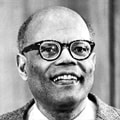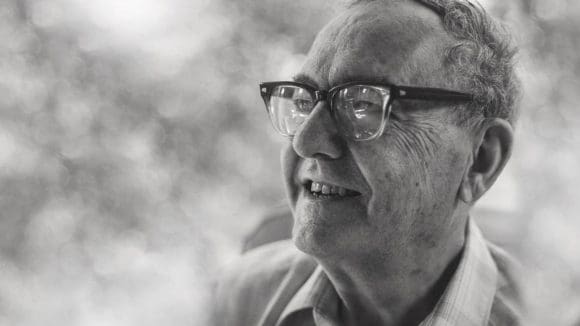Growing up in St. Lucia in the early 20thcentury, Arthur Lewis witnessed first-hand a territory that was very poor and still dealing with the aftermath of slavery. Lewis counts as one of the few economists in the early 50s who placed the economic progress of poorer countries at the forefront of his research. He described a model of the economy where a modern capitalist sector and an underdeveloped sector are in tension, leading to long-lasting inequality and lower wages. His work on economic development and theories about why some countries continue a cycle of poverty challenged the thinking of the time. He reasoned that instead of depriving the poor, investing in them pays off and helps a country’s economy. The aftereffects of his works were described like those of a blooming flower; they released the seeds from which numerous groundbreaking systems grew.

Sir Arthur Lewis
Sir Arthur Lewis
The Sveriges Riksbank Prize in Economic Sciences in Memory of Alfred Nobel (shared), 1979
At a glance
At a glance
Born: 1915, Castries, St. Lucia
Died: 1991, Bridgetown, Barbados
Field: Development Economics
Prize-winning work: Pioneering work in economic development research with a focus on the causes of poverty in developing countries
A career of firsts: Was the first black person to be appointed to the faculty of the University of London. Something he admitted was unlikely to have happened 10 years before
A true race issue: Only noticed that he was treated differently when looking for accommodation in London
Guilty pleasures: Dancing. He kept on dancing after being married. (Before marriage, he’d danced to get to know girls.)
A "first achiever" in many ways
A "first achiever" in many ways
Lewis was a trailblazer in many ways. He was the first black professor at the London School of Economics, the first economic advisor to the democratic government of Ghana and the first president of the Caribbean Development Bank. He also worked for the United Nations, advised and assisted multiple governments and travelled to the most remote parts of the world. Still, Lewis was known for his modesty and humbleness. Homeschooled, he learned more in three months from his father than some students learn during two years at school.
Lewis considered his life to have been relatively normal. Even after receiving a knighthood, Lewis never rested on his achievements or his titles but constantly fought for what he believed in.
“I’ve never won an argument by saying, ‘Look I’m a knight and you are not.’ In my opinion, the only real test for your personal achievement is how far it brought others,” he said. “Whenever you write or state something, it’s like the opening of a door. Therefore, the effects of publication or of the Nobel Prize must be such that a door is opened through which a lot of people want to go.”
Why is unemployment a worldwide phenomenon?
Has this question inspired you?
Get the latest Nobel perspectives delivered to you.
Is unemployment indigenous to economic progress?
Is unemployment indigenous to economic progress?
Throughout his travels, Lewis learned that one could only influence economic fields where the patient recognizes the problem. When asked about the state of progress he witnessed in these countries, he shared two conclusions. "The short answer is that there has been tremendous progress,” he said. “And the long answer is unemployment is so much greater."
Lewis recalled that during his childhood in the Caribbean, the boys didn’t wear shoes, nor did they have bicycles, both of which are common goods today. He spoke about Barbados, where housing conditions had greatly improved, and that water supplies extended throughout the islands. At the same time, he witnessed the imbalance of consistently high levels of unemployment.
Unemployment is becoming indigenous to our system as a whole. It’s not a developing country phenomenon, it is a worldwide one.
As Lewis explained, the development of any group within society is dependent on publically available resources like clean water, hospitals, schools and roads. "You’re creating an urban working class and middle class, but that’s relatively small, and you’re doing it by putting education and these other things at the disposal of the existing working class, so you’re constantly expanding the proportion of the population," he said.
Why do the rich exploit the poor?
With inequality rising over the last 50 years, many economists have tried to explain that any change in the distribution of income continuously moves in favor of those at the top.
In 1980, the Rockefeller Foundation turned to Lewis for support to design new tools to tackle these issues. Lewis’s stance against inequality was very clear and he argued against exploitation by using economic rational to his advantage.
"Why do the people with the power use it against the ones without power?” he asked. “On economic grounds, the sensible thing to do is to invest in the poor, not to kill them. We have always assumed that it would pay the rich to exploit the poor. We’ve always assumed that slavery paid. I’m sorry, but slavery doesn’t pay.”
Why do the rich exploit the poor?
Will racism destroy civilization?
Lewis often described his work on government advisory boards as a simple discussion between friends, who may or may not understand the subject better than he did himself. "I was a citizen of the world," he explained, "I was constantly around, available to all, a friend of mankind. Everybody who knew me knew that I was not a nationalist. I was born to be a citizen of the world."
However, Lewis also confronted criticism and experienced discrimination. Despite international efforts to curb racism over the last century, nationalism and xenophobia have established firm roots in major political movements and rhetoric. With hate crime having increased by 57 percent in the UK since the referendum was held on membership of the European Union and the United States seeing a sharp rise in racially charged incidents or anti-Semitic aggression since the election of President Donald Trump, Lewis’s plea is not only still relevant, it is powerful.
"Racism will destroy civilization," he said. "Those of us who see what’s happening should talk about it."
Is racism getting worse?
Has this question inspired you?
Get the latest Nobel perspectives delivered to you.
The economist John Maynard Keynes once said that the difficulty lays not so much in developing new ideas as in escaping from old ones. Lewis reminds us that humanity needs to take a step forward and make an important shift in our conceptual thinking. We must acknowledge that we are in times where the value of labor no longer rests on manual work, but rather in cognitive skills. Discrimination based on race, gender or other factors is nothing more than an obstacle to further human development, and thus should come to an end. He reminds us that the true road to industrialization is through education and investments in human capital.
Why do countries have to find better ways to grow?
Hear Michael Spence's view on how countries can grow sustainably while having a long-lasting positive impact.
What does Lewis's work mean for us?
"He asserted that emerging market growth was driven by developed economy growth – this was the world of the late 1970s but, of course, also describes the world today.”
Paul Donovan
Global Chief Economist UBS Wealth Management
More Nobel Laureate stories
Has this question inspired you?
Get the latest Nobel Perspectives updates delivered to you.



